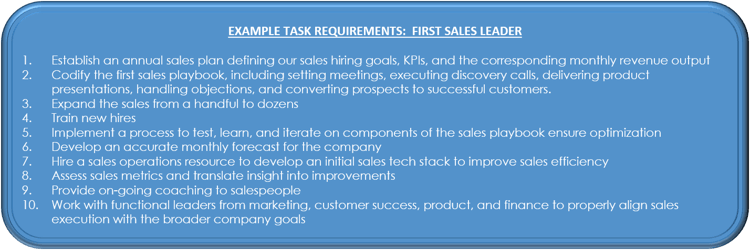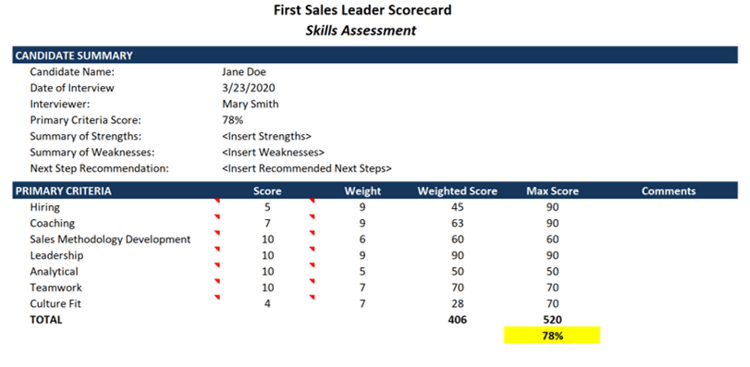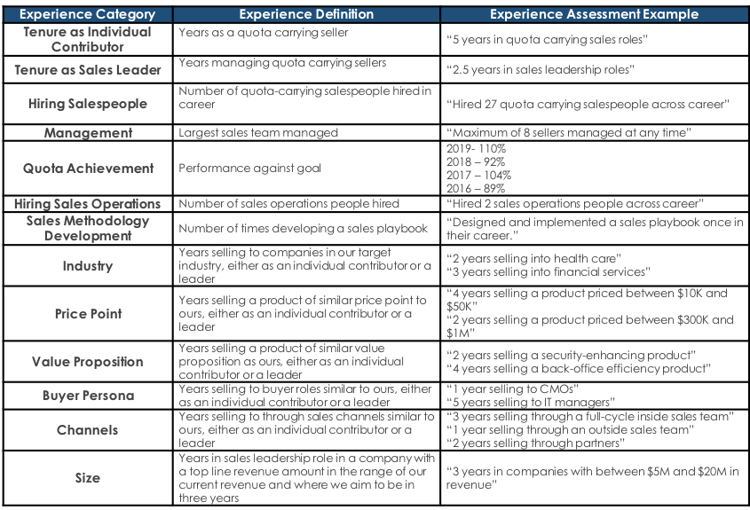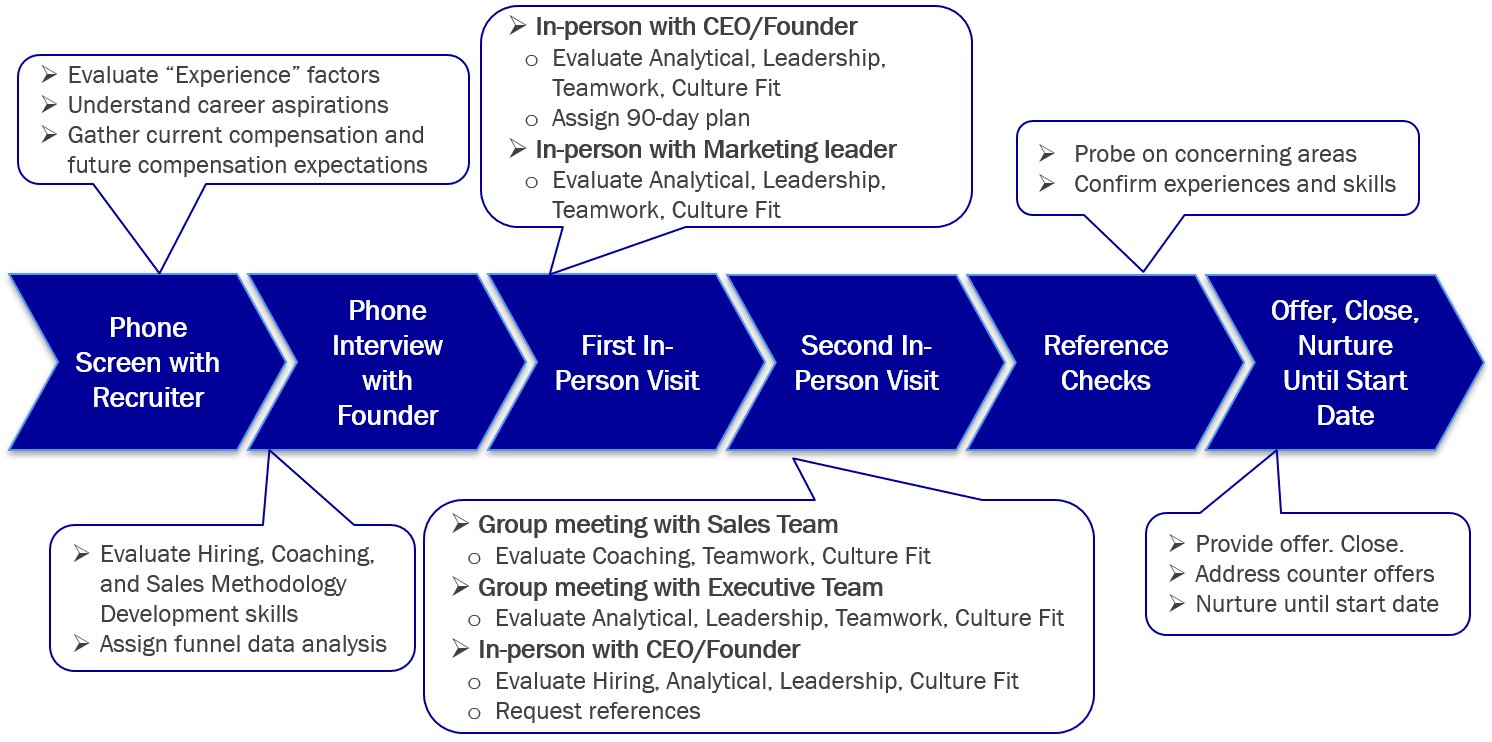Hiring the first sales leader is a make-or-break decision for a startup and the founding team. Get the hire right and you will likely accelerate your revenue growth for the next few years. Get it wrong and it may sink you. So, who do you hire?
What are two of the most common mistakes we see founders make when hiring their first sales leader?
- Overweighting industry experience and under evaluating sales leadership experience. Often, with minimal domain knowledge on selling, product founders base this hiring decision largely on the candidate’s industry experience. However, this lens is extraordinarily insufficient. We end up with a poor sales leader from our industry. We would have been much better off with a great sales leader from outside of our industry.
- Hire a leader appropriate for 10 years out vs. 2 years out. The other common mistake we make as startup founders is hiring a leader too far beyond our current stage. Even though our goal is to scale from $5 million to $20 million over the next two years, we are pressured by our investors to hire someone that has taken a company to$100 million. By pursuing this strategy, we struggle to convince candidates join us, over-pay for what we need, and end up with a leader that implements processes appropriate for a $100 million company into one that is at $5 million.
After working with dozens of early stage companies to help them hire their first sales leader and hiring over 100 directly, here are 3 steps to hiring a rock star first sales leader that we’ve outlined in the Hiring the First Sales Leader Playbook.
Download our Hiring the First Sales Leader Playbook here
- Step 1: Role Definition: What tasks does the organization need this person to do in the next two years?
- Step 2: Hiring Scorecard: Based on the role definition, what skills and experiences should we evaluate the candidates on during the interview process?
- Step 3: Evaluation Process: What are the steps in the evaluation process and how do we execute each step?

Step 1: What tasks does your organization need this person to do?
Every founder would love to hire a sales leader that has the right experience and is a master at recruiting, an inspirational leader, a data analyst, an in-the-weeds operator, a hands on sales coach, a sales methodology expert, and a messaging genius. These sales leader unicorns exist but they are hard to find, so you want to prioritize what is most critical to get your organization to the next stage.
- Where do they need to focus to drive growth? Common tasks for first sales leaders include:

In addition, prioritize the skills that only this person can do vs. what you can outsource. For example, you can outsource technology configuration, marketing or sales operations functions. You can’t outsource coaching, selling and leadership.
- How do they compliment your competencies? As a founder, ask yourself these two questions:
- Where do you naturally gravitate and what is most important to you? It’s important for both your success and your sales leader’s success that they can excel in the area that you think is critical. If you like being in front of customers and feel that building strategic relationships is important but your sales leader does not, this misalignment will create more conflict and distraction as you grow.
- Which of these do you need most but is not on your list of strengths? After identifying what is most important that you like doing, identify what is important but you don’t want to do it and/or have the experience to do. Make sure you make that the #2 skill you need in your sales leader.
Step 2: What skills and experience are most important at your stage?
Now that you have your tasks outlined, you can translate this into skills and experience needed to do those tasks. Break them out into the skills they need to do those tasks, and the experience that is relevant to develop that skill. For example, if defining and developing your sales methodology is a critical need, you will want to define what sales methodology looks like for scoring, as well as the experience your candidate needs.
Common skills your first leader should have
Here's an example of the skill primary criteria below used in a scorecard to assess the candidate.
Download our First Sales Leader Scorecard here
 Prioritize the experience that is most important to your role
Prioritize the experience that is most important to your role
You should pick the top 5 and then define them to help you quickly assess candidates that should not move forward in the first conversation. 
Download the Hiring the First Sales Leader Playbook for detailed skill descriptions and scoring recommendations.
Download our Hiring the First Sales Leader Playbook here
Step 3: Define your evaluation process
With the evaluation criteria clearly defined, we can now design a detailed evaluation process. The evaluation process includes the high level steps in the overall assessment process, the people involved, and suggested questions in each step. An example of an evaluation process is:

Additional Tips
- Ask for real life examples.
- My favorite interview questions are questions like “Tell me about a time when…” or “When you took X job, what 3 things did you prioritize to hit the revenue goal you inherited and why?”. When you ask people how they would do something, they can generally come up with a somewhat relevant answer. We are salespeople, after all. But when you ask people to give you a specific example of something they have done and how they did it, you’ll find it’s much harder for them to make it up. You get a clearer picture of where they are confident in their experience.
- You can also ask for examples of things they are using today in their current role. For example, if managing reps to activity is important to you and your candidate is sharing how they do that, ask them to send you a screenshot of the dashboard they are currently using.
- Require your team to use the scoring to evaluate candidates, not just emotion. Making a decision typically involves both science and art. You can score them on the experience and skill competencies and compare those to help narrow down the candidates, but the overall fit is usually the tipping point. You want to use the scoring to make sure that you don’t hire on emotion and realize later that they don’t actually have the skill set you need.
- Bring your top 2-3 final candidates in to present as a way to evaluate them.
- Select a topic that is most relevant to the skills and experience you need. For example, if developing strategic partners is most important to your revenue growth, ask them to sell you the product/relationship as if you were a strategic partner. If building the organization is more important, have them present a 90 day plan.
- Evaluate the process equally to the presentation. When they are preparing, do they reach out to your team for more information? Did they do research? This process shows you how they would work with the team and how they think.
- Turn it into a discussion. After the presentation, use it as an opportunity to assess how the candidate takes feedback and how they've evolved in their thinking on the product, go to market strategy, or market opportunity.
There is no magic bullet, but following these steps to help you find the right sales leader will save you time to market and reduce your execution risk.


